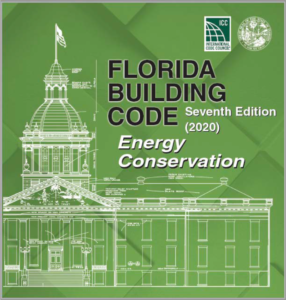 The 7th Edition Florida Building Code (2020) includes a number of changes to the Energy Conservation Code that will impact how new Florida buildings are constructed, lit, and controlled. Learn about the code and these changes, and earn continuing education credits by attending live webinar training courses offered by the FSEC Energy Research Center. Register by October 8*.
The 7th Edition Florida Building Code (2020) includes a number of changes to the Energy Conservation Code that will impact how new Florida buildings are constructed, lit, and controlled. Learn about the code and these changes, and earn continuing education credits by attending live webinar training courses offered by the FSEC Energy Research Center. Register by October 8*.
- RESIDENTIAL: October 19 (1 p.m. to 3:10 p.m.)
Overview of the 7th Edition (2020) Residential Florida Energy Conservation Code [Live Webinar]
In this 2-hour class, topics include Prescriptive, Performance and Energy Rating Index (ERI) compliance options, and discussions of residential building air leakage testing, duct leakage testing and mechanical ventilation requirements. CILB CEUs: 2 credits; CILB# 0613599; Provider# 0000859. Cost: $99 | Register
- COMMERCIAL: October 20 (1 p.m. to 5 p.m.)
Florida Commercial Energy Code Compliance: Methods, Tools and Verification [Live Webinar]
In this 4-hour class, topics include an examination of building energy use contributors, introduction to the 7th Edition (2020) Florida Energy Conservation Code commercial provision changes, review of Commercial Energy Code compliance methods and tools, running sample calculations to assess the effects of specific improvements on energy efficiency and code compliance, and verifying code forms and identifying common errors. CILB CEUs: 4 credits; CILB# 0613600; Provider# 0000859.
Cost: $199 | Register
Explore all of FSEC Energy Research Center’s continuing education courses at https://energyresearch.ucf.edu/education/continuing-education/
*A minimum of 8 registrations needed by October 8th to guarantee the class is held.
For more information, contact Sherri Shields at sherri@fsec.ucf.edu, 321-638-1019 or the FSEC ERC Communications Office at 321-638-1015.
###
PR21-13
